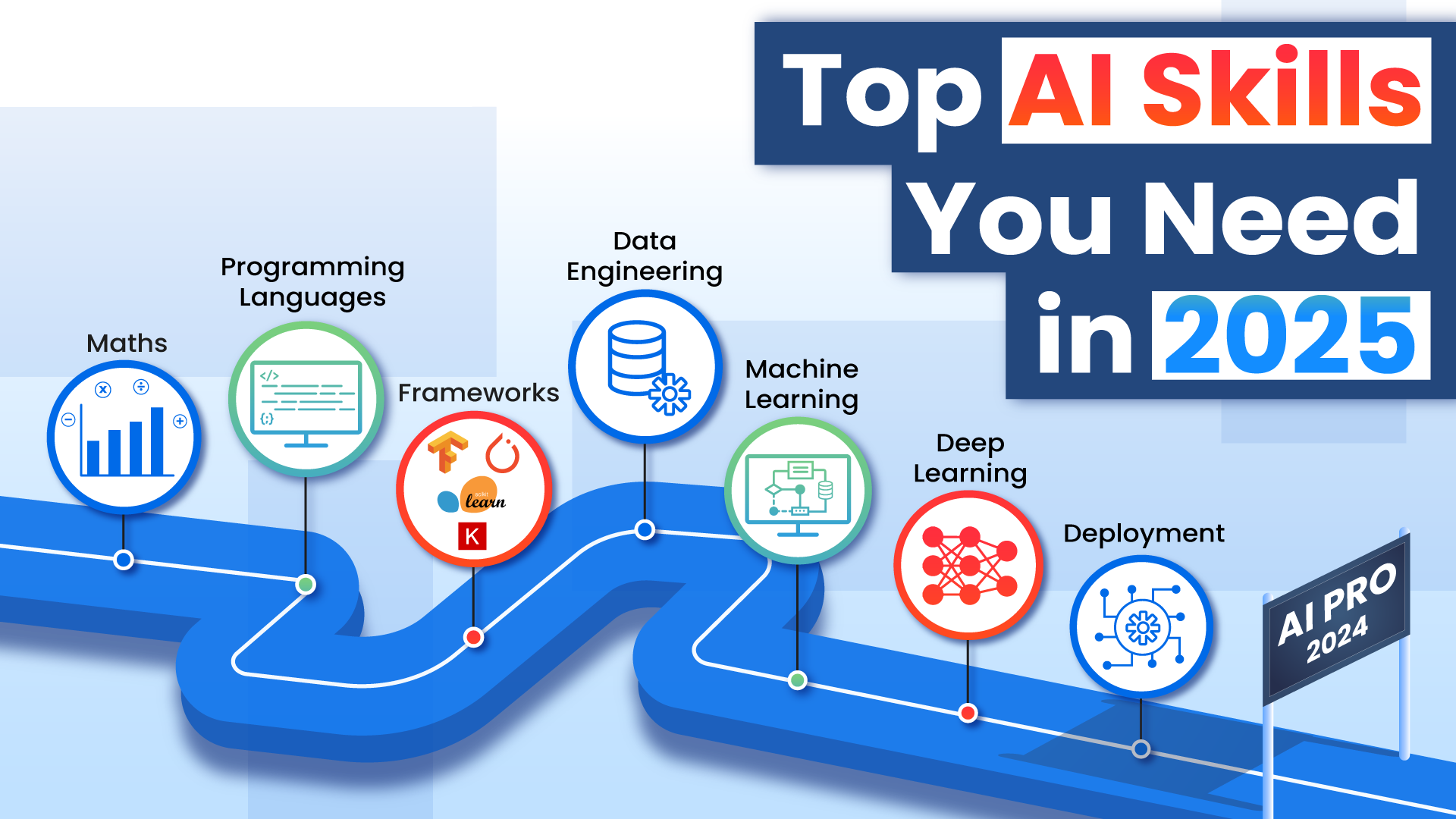Artificial Intelligence (AI) is no longer a futuristic concept—it’s shaping our lives in real-time. From chatbots answering customer queries to self-driving cars, AI is everywhere. And as we step into 2025, the demand for AI skills is higher than ever.
But with so many AI-related skills out there, which ones are actually worth learning? Whether you’re an aspiring AI engineer, a business professional looking to stay relevant, or just someone curious about the field, this guide will walk you through the top AI skills you should focus on in 2025.
At the heart of AI is Machine Learning (ML)—the ability of computers to learn from data and make decisions. ML powers everything from recommendation algorithms (like Netflix and YouTube) to fraud detection in banking.
✔️ Supervised & Unsupervised Learning – Understand how models learn from labeled and unlabeled data.
✔️ Neural Networks & Deep Learning – Learn how AI mimics the human brain using frameworks like TensorFlow and PyTorch.
✔️ Natural Language Processing (NLP) – If you want to work on chatbots or language models like ChatGPT, this is a must.
✔️ Reinforcement Learning – Essential for robotics, game AI, and automated decision-making systems.
📌 Where to Start: Courses from Coursera, Udemy, or Fast.ai can help you master ML basics.
If AI is the brain, programming is the language it speaks. Python remains the top choice due to its simplicity and vast AI libraries, but other languages like R and Julia are also useful for data science.
✔️ Python & Libraries – Master NumPy, Pandas, Scikit-Learn, TensorFlow, and PyTorch for AI development.
✔️ R for Statistical Analysis – Great for data-heavy AI applications.
✔️ SQL & NoSQL Databases – AI systems work with huge datasets, so database skills are a must.
📌 Where to Start: Try Python for Data Science courses on Kaggle or DataCamp.
AI is only as good as the data it learns from. In 2025, companies will need data experts who can clean, analyze, and extract meaningful insights from massive datasets.
✔️ Data Preprocessing & Cleaning – Learn how to prepare raw data for AI models.
✔️ Data Visualization – Use Matplotlib, Seaborn, and Tableau to present AI findings.
✔️ Big Data Tools – Master Apache Spark, Hadoop, and Google BigQuery to handle huge datasets.
✔️ Feature Engineering – Learn how to optimize data inputs for better AI performance.
📌 Where to Start: Hands-on projects with Google Dataset Search or Kaggle competitions.
With AI becoming more powerful, ethical concerns are growing. In 2025, companies won’t just hire AI developers—they’ll also need experts in AI ethics to ensure fairness, transparency, and accountability.
✔️ Bias in AI – Understand how AI can discriminate and how to prevent it.
✔️ Explainable AI (XAI) – Learn how to make AI decisions more transparent.
✔️ AI & Privacy Laws – Stay updated on laws like GDPR, CCPA, and India’s Digital Personal Data Protection Act.
✔️ Fairness & Inclusivity in AI – Ensure AI models don’t favor one group over another.
📌 Where to Start: Google’s “AI Ethics” course and Harvard’s “Data Science: Ethics” are great choices.
AI requires huge computational power, and cloud platforms make this possible. Cloud AI services allow businesses to build and deploy AI models without expensive hardware.
✔️ AWS, Google Cloud, and Microsoft Azure – Learn how to train AI models in the cloud.
✔️ Serverless Computing – Understand how to build scalable AI applications.
✔️ Kubernetes & Docker – Essential for AI model deployment and management.
📌 Where to Start: AWS and Google Cloud offer free AI/ML learning resources.
AI is no longer just analyzing data—it’s creating content, writing code, and generating images. If you want to work in content creation, marketing, or automation, learning how to use Generative AI models like ChatGPT, DALL·E, and MidJourney is a game-changer.
✔️ How Generative AI Works – Learn about Transformer models and Large Language Models (LLMs).
✔️ Prompt Engineering – The art of crafting perfect AI prompts for better results.
✔️ Fine-Tuning AI Models – How to customize AI models for specific tasks.
✔️ AI for Content Creation – Using AI to generate articles, designs, and even music.
📌 Where to Start: OpenAI and Hugging Face offer free resources to master Generative AI.
With AI-powered cyberattacks on the rise, businesses need AI to detect threats, prevent fraud, and secure systems. AI in cybersecurity is a booming field in 2025.
✔️ AI-Driven Threat Detection – Learn how AI can identify cyber threats.
✔️ Anomaly Detection & Fraud Prevention – Understand how AI fights online fraud.
✔️ Biometric Authentication & AI Security – AI-powered facial recognition and fingerprint security.
✔️ Adversarial AI & AI-Powered Hacking – Learn how AI can be misused and how to defend against it.
📌 Where to Start: Cybersecurity courses by IBM or EC-Council cover AI-based security.
AI is also transforming robotics—from self-driving cars to warehouse automation. If you’re interested in the intersection of AI + Hardware, robotics is a great field to explore.
✔️ Computer Vision – AI-powered image recognition (useful for self-driving cars and medical AI).
✔️ Autonomous Systems – AI-driven robots that operate without human intervention.
✔️ Edge AI & IoT – AI on small devices like smart cameras and voice assistants.
📌 Where to Start: Udacity’s “AI for Robotics” by Sebastian Thrun is a great choice.
AI is evolving at lightning speed, and learning these skills will make you future-proof. Whether you’re a developer, entrepreneur, or student, mastering AI isn’t optional anymore—it’s a necessity.
💡 Start small, build projects, and apply your knowledge in real-world scenarios. The best way to learn AI isn’t just by reading—it’s by doing.
👉 So, which AI skill are you excited to learn in 2025? Drop your thoughts in the comments below! 🚀
